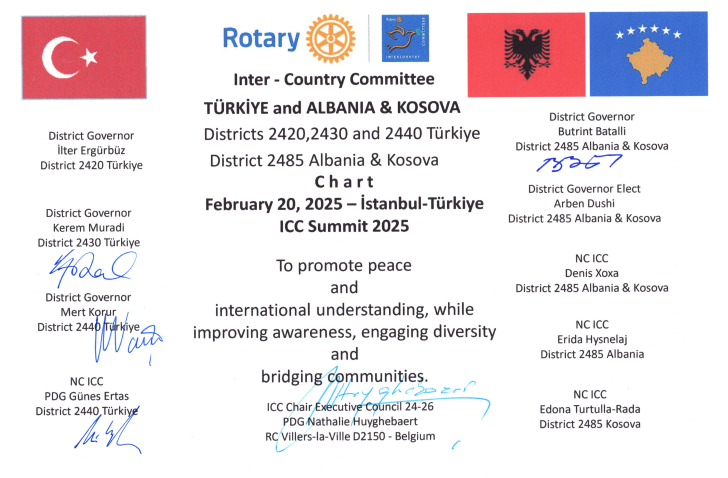Rotary’s first program dedicated to peace
In 1950, in Strasbourg, German and French Rotarians created the first Inter-Country Committee.
Understanding each other, renewing friendly relations after two world wars, and moving forward together to build peace in Europe, these were their motivations.
1950 is not neutral.
The UN and UNESCO themselves had just been created. The UN to « to save succeeding generations from the scourge of war » and UNESCO to construct in the minds of men « the defenses of peace ».
2 organizations for which the Rotary International and the Rotarians are qualities took an active part:
- In the drafting of the United Nations Charter in 1945 in San Francisco
- In the conference of Ministers of Education in 1942 in London: the one that will decide on the creation of UNESCO.
Moreover, Rotary will organize each year at the UN in New York, the « Rotary Day », interrupted during the Cold War but resumed since 1985 without interruption; supplemented in recent years by « Rotary Day » at UNESCO.
Thinking and acting for peace very quickly led to other Inter-Country Committees flourishing while the governments of the six founding countries drew the outlines of the future Europe.
The Rotarian Inter-Country meetings will soon extend to French-speaking African countries and the Middle East, then South America, helping to strengthen a cultural and humanist arc in line with their aspirations for emancipation and progress.
Every year until 1988, the general assembly of the Inter-Country Committees will be held in Strasbourg at the Council of Europe. The Presidents of RI will very often be present or represented, as will the senior leaders of the European community.
The fall of the Berlin Wall in 1989 opens up a new vocation for the committees in which they will be particularly dynamic: the rebirth and expansion of Rotary in Central and Eastern Europe.
Rotary and the newly created Inter-Country Committees are for these new Rotarians the embodiment of newfound freedom and friendship across borders.
The international meetings of the committees are multiplying although Rotary has stopped their funding:
- in Montpellier in 1992, in Lille in 2001, in Antibes Juan les Pins in 2003 – Presidential Conference – in Istanbul in 2007, in Cannes in 2008 « The peace is possible » – all in the presence of the President of RI –
- at the Conventions of Birmingham in 2009 and Montreal in 2010 and in European institutes.
In 2007, an American association « Friends of Russia » became a United States / Russia InterCountry Committee. It receives its charter in Evanston, which will subsequently promote the establishment of committees in the United States.
The organization and procedures specific to the Inter-Country Committees: the two sections and their governance, the National Coordinator were approved in 2007 by the Rotary Board of Directors. The Executive Council is thus vested with international promotion and relations with RI headquarters.
Then it will be Bucharest in 2008, Tunis in 2009, Strasbourg in 2010, Berlin in 2011 and UNESCO in 2015.
Until the Taipei pre-convention in 2021 (virtual meeting for Covid cause) entirely dedicated to the committees and their service opportunities, a landmark first in their history.
Asian countries have adopted the concept and created an India/Pakistan committee.
An innovation: Rotarians from 7 Southeast Asian countries have formed an Inter-Country Committee.
Today there are 500 committees as many embassies of dialogue for peace, apolitical and agnostic.
With the new century, the search for peace has also evolved. After the notion « culture of peace », UN and UNESCO advocate the « peace sustainability » and the « positive peace ».
Rotary International contributes to the positive peace through its vision of the world, through the 7 causes it defends, its Inter-Country Committees, its network of Representatives to international institutions, its Exchange programs for young people, its Scholarships, its Centers for Peace, its Friendships of action.
For the International Institutions, the ambition to transform the world remains possible through the implementation of the major development plan of the United Nations: the objectives of sustainable development. An integrating model which identifies the modalities and conditions prior to the establishment of peace.
Success contingent on firm commitments and a ‘society/government’ global civil cooperation
initiative.
Until then, the Inter-Country Committees will continue to build bridges of friendship, to open the diplomatic channel for aid, understanding and dialogue in conflict zones, to share their concerns for loyalty and fairness in human relations, and to act in social responsibility.
Moving forward with other goodwill on the « long road to peace ».
Serge Gouteyron
Past Rotary International Vice President
Chairman of the Inter-Country Committees 2007/2010 – Honorary Chairman
Lille, October 15, 2022


